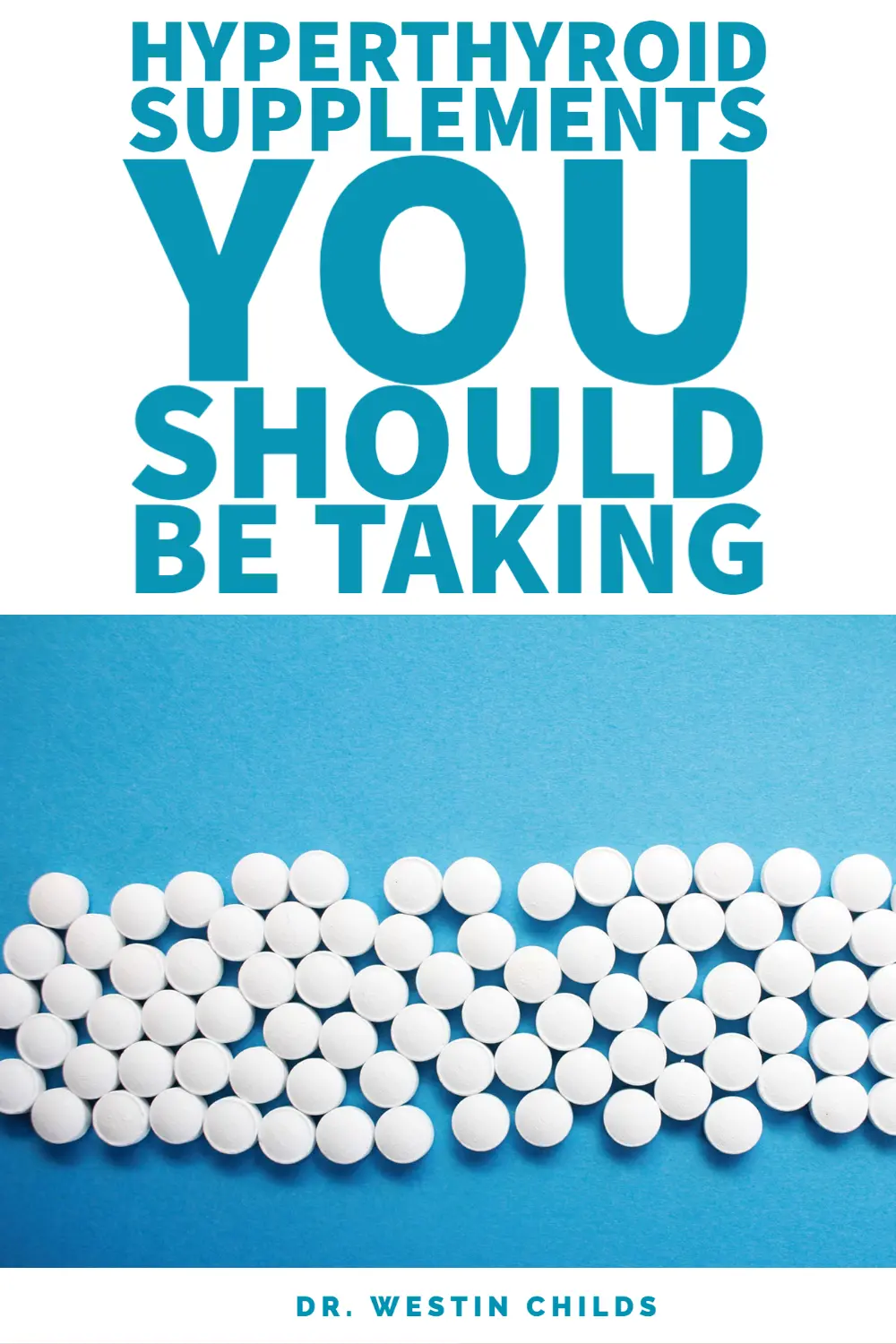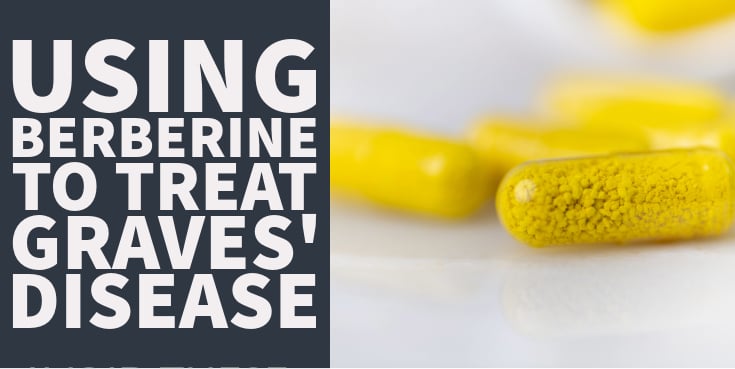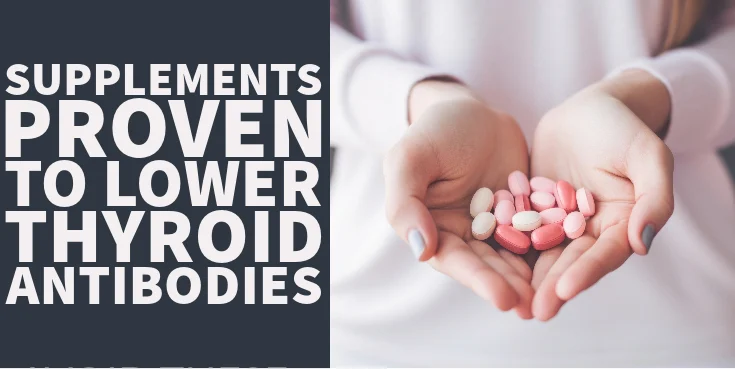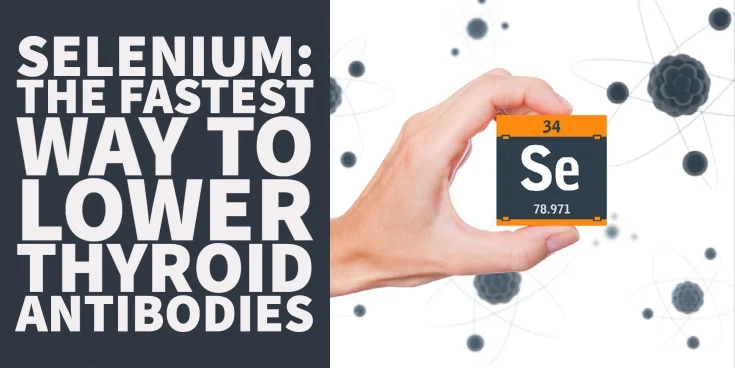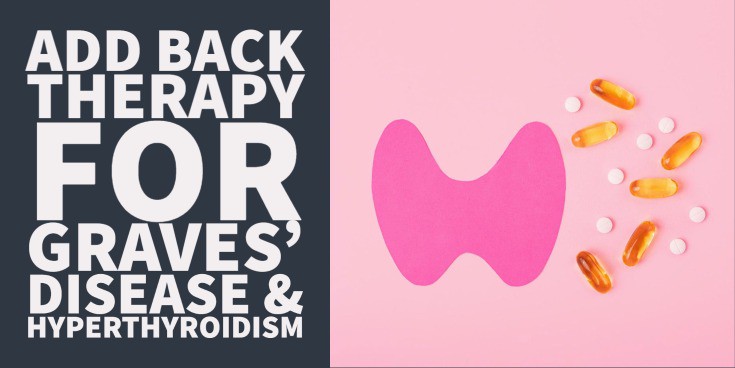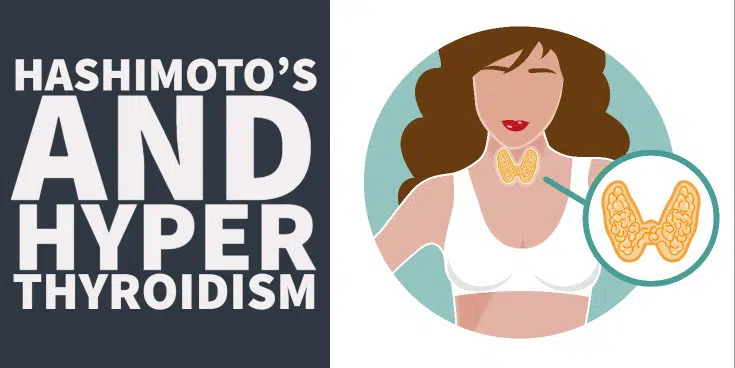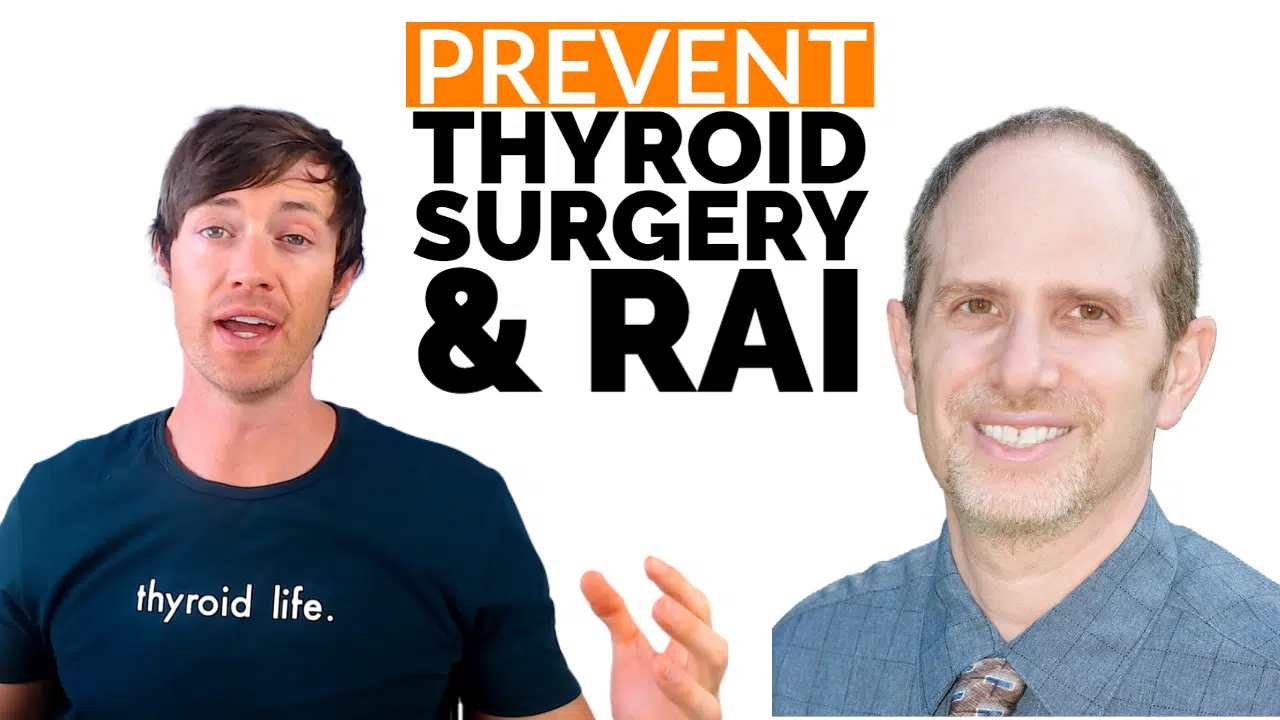Certain supplements have the potential to reduce inflammation and treat autoimmunity.
This is extremely important for hyperthyroid patients when you consider that, in most cases, hyperthyroidism is caused by an autoimmune condition known as Graves’ disease.
Learn more about how to supplement for hyperthyroidism and what you can do to take control of your symptoms in this guide:
Do supplements Actually help patients with Hyperthyroidism & Graves’ Disease?
Yes! Supplements can absolutely help you treat your hyperthyroidism.
Having said that you need to be realistic:
While taking these supplements won’t cure your disease state, they can certainly help with your symptoms and, if coupled with other changes, may dramatically improve your quality of life.
And that’s really what we are after.
So which supplements should you consider using?
The first step is to consider what kind of disease hyperthyroidism is.
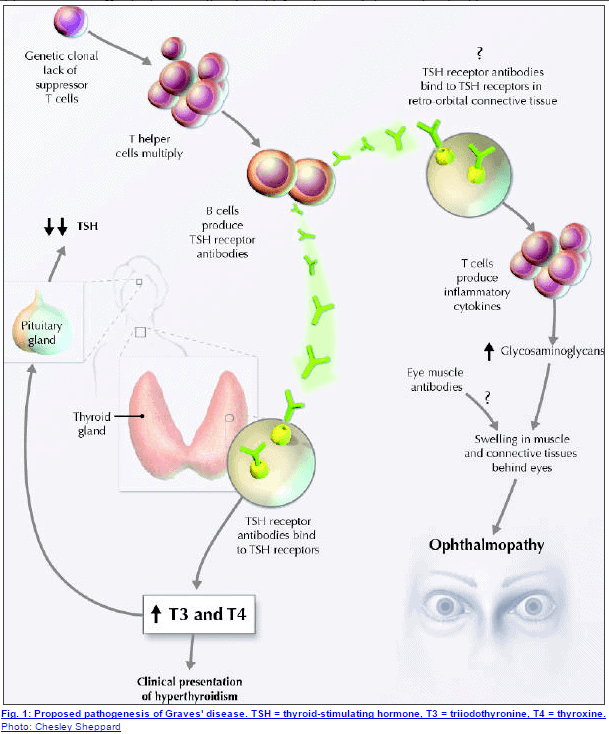
If you’ve read the research you will know that around 90% of patients with hyperthyroidism have an autoimmune condition known as Grave’s disease (1).
This is also true for hypothyroidism, by the way, about 90% of hypothyroid patients have an autoimmune disease known as Hashimoto’s thyroiditis (2).
The fact that hyperthyroidism is usually caused by autoimmune disease is VERY important because it means we can target your immune system to help improve your condition.
What you may not realize is that autoimmune disease is a manifestation of other problems in your body.
Why?
Because several factors have been shown to be involved in the cascade that leads to autoimmune disease, things such as stressful situations (3), nutrient deficiencies, and changes to your gut.
This is why so many people focus on therapies targeting your GI tract when treating autoimmune diseases.
If we can take supplements that target these pathways we can cool down the inflammation and autoimmunity in the body and reduce the symptoms of hyperthyroidism (and really treat the disease itself).
Make sense?
Now when it comes to hyperthyroid patients this is a little bit more complicated than that, though.
Why?
Because many patients diagnosed with hyperthyroidism eventually undergo thyroidectomy or RAI which effectively destroys their thyroid gland.
This means they switch from being hyperthyroid to hypothyroid, and this change also means that you need to use different supplements.
If you’ve had a thyroidectomy or RAI as a result of your hyperthyroidism then you can find relevant supplements in this post.
If you still have your thyroid then please keep reading!
Our goal with these supplements will be to take you from a relapsed state to remission, and that is possible in some patients if they follow these steps completely.
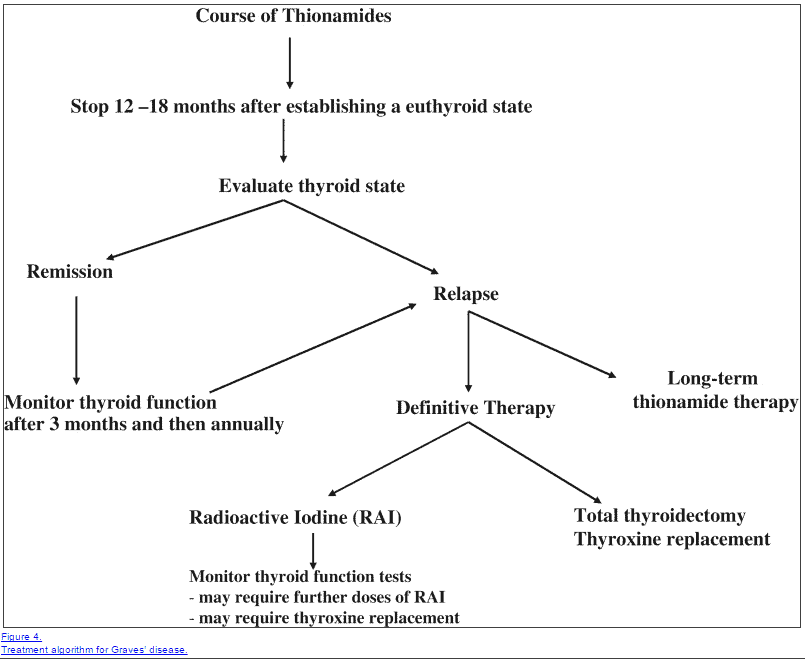
Using these supplements can help prevent the removal of your thyroid gland or undergoing RAI.
And this is a good thing considering so many patients who undergo these treatments suffer from debilitating weight gain and other problems.
Let’s talk about which supplements help hyperthyroid patients and which ones you should consider using:
DOWNLOAD FREE RESOURCES
Foods to Avoid if you Have Thyroid Problems:
I’ve found that these 10 foods cause the most problems for thyroid patients. Learn which foods you should avoid if you have thyroid disease of any type.
The Complete List of Thyroid Lab tests:
The list includes optimal ranges, normal ranges, and the complete list of tests you need to diagnose and manage thyroid disease correctly!
#1. Probiotics (Broad Spectrum with High CFU Count)
The first supplement we need to talk about is probiotics.
Why?
It turns out that autoimmune disease may originate (in many cases but not all) in your GI tract.
Various factors (including stress, hormone imbalances, nutrient deficiencies, etc.) can damage the intestinal lining of your gut – the tight junctions.
This lining is meant to act as a barrier that allows the absorption of good materials and prevents other more sinister materials from being absorbed.
When damage occurs the lining in your GI tract becomes compromised resulting in the absorption of bacteria and/or undigested proteins which can trigger autoimmune disease.
This process by which this occurs is known as molecular mimicry.
The breakdown of the lining of your GI tract is known as increased intestinal permeability or leaky gut.
So where do probiotics fit in?
Probiotics and prebiotics can help improve the structure of your GI tract and reduce the permeability of these tight junctions.
Probiotics also help to reduce inflammation and act to balance intestinal microflora leading to a healthy population of gut bacteria.
What about prebiotics?
Prebiotics are designed to help HEALTHY bacteria grow and really act as a food store for these little guys.
Probiotics themselves directly act to help populate your GI tract while prebiotics promotes the growth of new healthy bacteria.
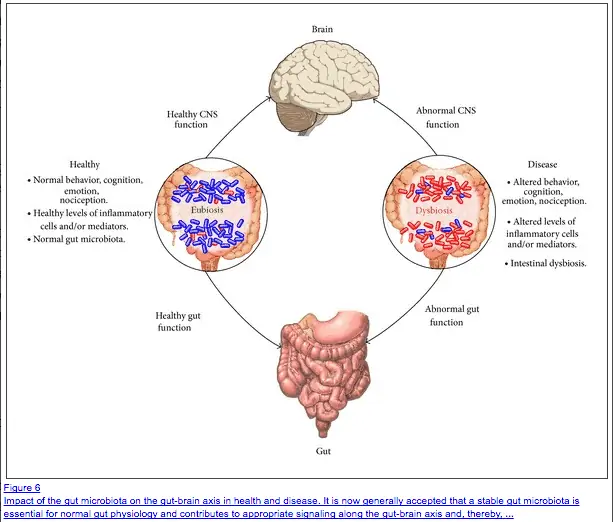
You can see the connection between your brain, GI tract, and intestinal function in the image above.
What you need to realize here is that while probiotics are helpful in improving GI function you may need more therapies than just this supplement.
For instance, many patients with autoimmune diseases also suffer from inflammatory conditions such as IBS or SIBO/yeast overgrowth.
The probiotics I recommend below are safe to use in these conditions and should be the first place to start.
#2. Zinc
Next on the list is Zinc.
Zinc makes this list for hyperthyroid patients because it has some special features that make it stand out.
First:
Zinc has been shown to balance the immune system and it’s required for optimal immune function (4).
Many patients are zinc deficient due to diet or other factors, so getting adequate zinc is helpful if you are suffering from autoimmune diseases like Graves’.
Second:
Zinc acts as a potent anti-inflammatory agent.
Again, this is helpful from the immune perspective because autoimmune diseases are a combination of altered immunity and inflammation.
Taking zinc can cool down the body and reduce inflammation (5).
Third:
It can actually balance thyroid hormone function (which is especially helpful if you are in the 50% of hyperthyroid patients who suffer from weight gain).
Zinc has been shown to normalize the T4 to T3 conversion process (6).
Believe it or not many hyperthyroid patients actually suffer from weight gain, and this supplement can improve that.
#3. Vitamin D3
Vitamin D (specifically vitamin D3) should almost be standard if you have hyperthyroidism or Graves’ disease.
Why?
Because it has been shown that low levels of Vitamin D can exacerbate and even cause hyperthyroidism to begin with.
In addition, these studies have also shown that taking Vitamin D3 may be able to reverse the condition (7).
That’s very powerful information and something that shouldn’t be taken lightly.
It has also been shown that hyperthyroid patients with Graves’ disease show a low level of Vitamin D3 at baseline (8) compared to other patient populations.
If you have Graves’ disease or hyperthyroidism you need to get your vitamin D levels evaluated and take a D3 supplement (the active form).
Low levels of Vitamin D have been shown to increase the risk of developing an autoimmune disease and in the specific case of hyperthyroidism may be able to reverse it.
Check your serum levels and treat to a level of around 50ng/mL.
#4. Fish Oil
Next up is Fish oil.
Fish oil is incredibly helpful for patients with hyperthyroidism because it’s a very potent anti-inflammatory agent (9).
Reducing inflammation is critical to normalize thyroid function due to immune issues.
As inflammation increases, thyroid function becomes abnormal, leading to conversion problems and promoting antibody production.
Taking fish oil helps reduce this cycle.
Oh, and fish oil has also been shown to help with weight loss which is a definite plus for many hyperthyroid patients who suffer from weight gain.
The combination of fish oil plus exercise has been proven to reduce fat stores in the body and increase lean muscle mass.
If you decide to take fish oil I recommend a very high-quality product that also contains astaxanthin which further increases the anti-inflammatory effects of fish oil.

#5. Magnesium
Magnesium makes the list because many hyperthyroid patients are also magnesium deficient.
In fact, it has been shown that thyroid dysregulation increases magnesium excretion from the kidneys (10) which means that thyroid patients are especially prone to developing a magnesium deficiency.
Couple that with the fact that magnesium is involved in proper immune function (11) and it’s easy to see why this supplement might be helpful.
Beyond its benefits to the immune function, magnesium is also involved in over 300 cellular processes so normal levels are necessary for optimal living.
If you take magnesium, make sure to take the right form of magnesium.
In this case, I recommend using magnesium bound to glycinate which will increase absorption and improve outcomes.
#6. Low Dose Iodine
Iodine makes the list because iodine can be used as a therapeutic agent in TREATING hyperthyroidism and Graves’ disease.
High doses of iodine have been shown to reduce thyroid production and alter thyroid conversion in the periphery.
This effect is on par with other pharmaceutical interventions and can be used as a natural treatment over these prescription medications.
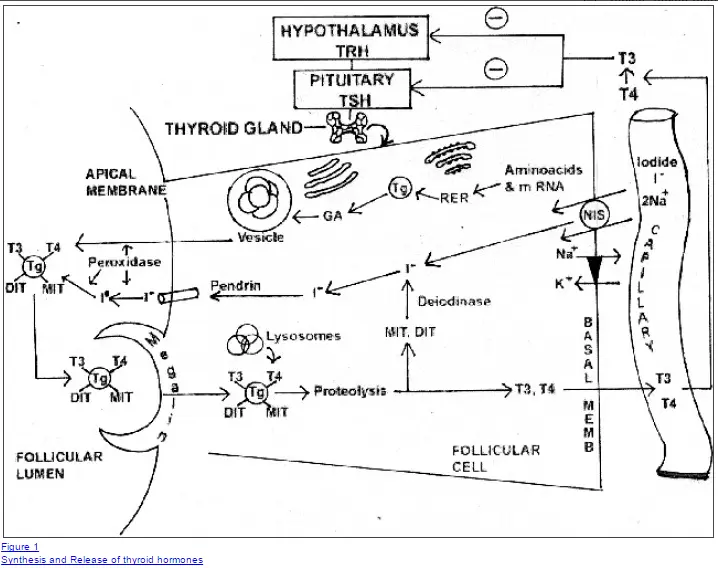
In fact, iodine was used prior to the discovery of newer medications for treating hyperthyroidism.
Using iodine in this way can allow you to take control of other aspects that may have triggered your autoimmune disease (Graves’) and allow you to treat those without undergoing RAI or thyroidectomy.
In order to get this effect, you must use high doses of iodine, but I don’t recommend doing this without the supervision of a physician.
You can read more about iodine supplementation here.
#7. Adrenal Support
Adrenal adaptogens are very important for any patient with thyroid-related issues.
Why?
Because adrenal function is closely tied to thyroid function.
Studies have shown this relationship.
What’s important for you to understand is that these changes to cortisol and adrenal function may manifest as the subjective symptom of fatigue or low energy.
Many patients with hyperthyroidism (Graves’) or hypothyroidism commonly present with fatigue.
This is felt to be, at least in part, due to changes in cortisol levels.
Taking adrenal adaptogens has been shown to normalize cortisol levels and many patients report an increase in symptoms when taking these supplements.
In addition, adrenal adaptogens help your body tolerate stress, help with weight loss, and can improve sleeping patterns (12).
Taking an adrenal adaptogen or adrenal supplement should be the baseline for anyone with hyperthyroidism or any thyroid problem.
Really, any combination of adaptogens can work but I personally recommend using ashwagandha.
Many patients have been told to avoid ashwagandha because it can be stimulating but my experience suggests that it is very well-tolerated and almost always helpful.
Rarely, some people can get overstimulated when using it, though, so you should be aware of that prior to supplementing with it.
If you’d prefer, you can also try other adaptogenic herbs such as ginseng, holy basil, aloe vera, cordyceps, Chaga, and so on.
#8. Selenium
Selenium is an important nutrient for anyone with hyperthyroidism because one of its primary functions is to protect the thyroid gland from inflammation.
It does this by helping your body produce the master antioxidant known as glutathione.
Selenium is also required for a number of other enzymes involved in thyroid function known as selenoproteins.
We also have evidence to suggest that those with hyperthyroidism (Graves’ disease) have lower than normal selenium levels.
When selenium levels are low the thyroid gland remains unprotected from oxidative stress and is more susceptible to autoimmune damage from thyroid antibodies.
This reason alone is enough to warrant the exploration of selenium supplements.
Beyond its protective impact on the thyroid gland, though, we also have evidence to suggest that selenium has the potential to improve treatment outcomes in patients taking methimazole.
When supplementing with selenium, keep your dose around the range of 75mcg to 150mcg from all sources (including the combination of food and supplements).
This will ensure that you don’t push yourself into the territory of excess selenium levels which can cause problems.
#10. Bugleweed (Lycopus) & Lemon Balm (Melissa officinalis)
The last two supplements listed here are really specialty-type supplements that work in a different way compared to those we have discussed already.
They have specific actions that, when used correctly, may help to manage hyperthyroidism at the level of thyroid function.
Here’s what I mean:
There have been studies that show that both of these herbs have the potential to block TSH production of TSH and thyroid-stimulating antibodies (13).
Part of this effect stems from their ability to block T4 to T3 conversion in peripheral tissues.
The net effect of all of these is that thyroid hormone levels fall.
In essence, they work as sort of a weaker and more natural version of methimazole.
The only problem?
They don’t always work equally well in every patient which means that some people will see bigger effects than others.
When they do work, though, they seem to work quite well.
There have been a handful of documented case studies as well as anecdotal patient experiences to suggest that these herbs have the potential to replace anti-thyroid medications in certain situations.
Just because this may be a possibility, though, doesn’t mean you should run out and try it without physician supervision, especially if you are already taking anti-thyroid medication like methimazole.
Never make any changes to your thyroid medications as doing so can lead to serious problems from the hyperthyroid state.
#11. Motherwort (Leonurus cardiac L.)
If bugleweed acts like methimazole then you can think of motherwort as something which is loosely similar to a beta blocker in terms of its impact on the body.
Motherwort has been shown to help block some of the extrathyroidal symptoms that patients with hyperthyroidism experience including symptoms like rapid heart rate and heart palpitations.
You will often find both motherwort and bugleweed used together as a sort of natural concoction to treat hyperthyroidism either in place of medications like methimazole and propranolol or in combination with these medications.
Much like bugleweed, though, motherwort doesn’t work in every situation and is not intended for long-term use.
If you are planning on using this herb for symptomatic control then you should also be utilizing other therapies in an attempt to try and reverse your condition so they are no longer needed.
And just like bugleweed, don’t use motherwort in place of your medication without physician supervision.
You can see two case studies from patients that were successfully treated for hyperthyroidism using a combination of both of these herbs here (13).
Final Thoughts
Supplements, if combined with other lifestyle factors, can dramatically improve thyroid function in hyperthyroid patients.
Your goal should be to target your supplementation to specific deficiencies in your body.
That being said certain supplements can almost be considered “standard” for hyperthyroid patients given that this hormone imbalance leads to certain deficiencies.
Now it’s your turn:
Are you suffering from hyperthyroidism?
Have supplements helped reduce your symptoms or improve your condition?
Why or why not?
Leave your comment below!
Scientific References
#1. https://www.ncbi.nlm.nih.gov/pmc/articles/PMC3474632/
#2. https://www.ncbi.nlm.nih.gov/pmc/articles/PMC4080848/
#3. https://www.ncbi.nlm.nih.gov/pubmed/18190880
#4. https://www.ncbi.nlm.nih.gov/pmc/articles/PMC2277319/
#5. https://www.ncbi.nlm.nih.gov/pmc/articles/PMC4429650/
#6. https://www.ncbi.nlm.nih.gov/pubmed/23960398
#7. https://www.ncbi.nlm.nih.gov/pmc/articles/PMC4133032/
#8. https://www.ncbi.nlm.nih.gov/pmc/articles/PMC4446781/
#9. https://www.ncbi.nlm.nih.gov/pubmed/16531187
#10. https://www.ncbi.nlm.nih.gov/pmc/articles/PMC292768/
#11. https://www.ncbi.nlm.nih.gov/pubmed/3075245
#12. https://www.ncbi.nlm.nih.gov/pmc/articles/PMC3991026/
#13. https://www.ncbi.nlm.nih.gov/pmc/articles/PMC8090196/
